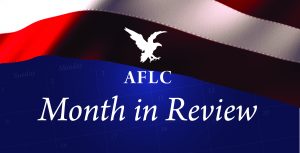 Here are the highlights for July:
Here are the highlights for July:
* On July 2, the California Court of Appeals ruled in our favor in an important free speech case.
Earlier this year, AFLC Co-Founder and Senior Counsel Robert Muise argued this case before a three-judge panel of the court.
At issue was whether the Irvine Company’s speech restriction prohibiting “grisly and gruesome” imagery as applied to restrict our clients’ abortion-related imagery violates the free speech provision of the California Constitution.
Unlike the First Amendment, which only applies to state action, under the California Constitution, large shopping malls are considered public forums for free speech, and private entities, such as The Irvine Company, may be liable for violating California’s liberty of speech clause.
The trial court upheld The Irvine Company’s speech restriction. And the California Court of Appeals reversed, stating, in relevant part:
“[The challenged speech restriction] is a content-based restriction that does not survive strict scrutiny review. So, we reverse the portion of the judgment finding the restriction on grisly or gruesome displays constitutional, and we remand to the trial court with directions to enter an amended judgment declaring it unconstitutional and enjoining its enforcement.”
This is a huge and important victory for the right to free speech.
* On July 8, we filed our reply brief in the U.S. Court of Appeals for the Sixth Circuit in our lawsuit against SMART, a Detroit-based, government-operated transit system that refused to display our clients’ “Leaving Islam” ad.
The ad stated: “Fatwa on your head? Is your family or community threatening you? Leaving Islam? Got questions? Get Answers!”
The “Leaving Islam” ad is sponsored by the American Freedom Defensive Initiative (AFDI), founded by Pamela Geller and Robert Spencer.
SMART rejected the ad, claiming it was “political” and “scornful” toward Muslims, yet SMART accepted an ad from an atheist organization that stated, “Don’t believe in God? You are not alone.” The atheist ad was just one of many ads accepted by SMART that were “political” under SMART’s definition.
The lawsuit alleges violations of the Free Speech and Equal Protection Clauses of the United States Constitution
* On July 11 and again on July 20, we filed supplemental briefs requested by the Court following oral argument on the Michigan Attorney General’s and the Director of the Michigan Department of Civil Rights’ motions to dismiss our federal lawsuit filed against them for targeting conservative groups such as AFLC based on the fact that the Southern Poverty Law Center, a radical leftist organization, labels the group a “hate group.”
The first brief was focused on testimony provided by the Michigan AG to the Michigan Senate Oversight Committee. The second brief was focused on testimony provided by the Director of the Michigan Department of Civil Rights to the same committee.
Our lawsuit alleges that these Michigan government officials are abusing their power and resources to target law-abiding citizens for disparate treatment based on their political views.
This Orwellian policy violates our rights protected by the First and Fourteenth Amendments, as we set forth in our briefs and during oral argument.
* On July 16, we filed a notice of supplemental authority in the Sixth Circuit in our appeal against the City of Sterling Heights.
In this lawsuit, we are challenging the City’s decision to permit the construction of a mega-mosque in a largely Chaldean Christian neighborhood, alleging that the decision was unlawful because the City violated its own zoning laws in order to permit the construction.
We are also challenging the City’s restriction on our clients’ free speech rights. During the City Council meeting to discuss the mosque construction, the Mayor would not let our clients express their opposition to the mosque based on the viewpoint of their speech. Several of our clients fled Muslim persecution in Iraq and had serious concerns about the mosque. The Mayor deemed their speech critical of Islam and thus banned it.
In our filing with the Sixth Circuit, we brought to the appellate court’s attention a recent U.S. Supreme Court decision in which the court confirmed that “a law disfavoring ‘ideas that offend’ discriminates based on viewpoint, in violation of the First Amendment.”
We are awaiting the Sixth Circuit’s decision.
Thank you for your prayers and support!
